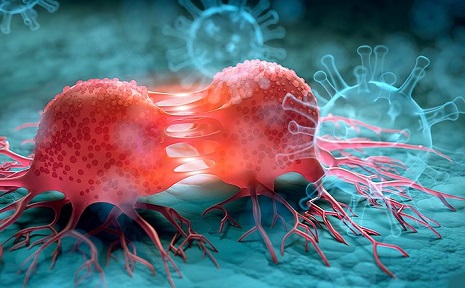SARS-CoV-2 Spike Suppresses p53-Dependent Gene Activation, Impacting Tumorigenesis, Tumor Progression And Chemotherapy Sensitivity!
Nikhil Prasad Fact checked by:Thailand Medical News Team Apr 16, 2024 1 year, 8 months, 3 weeks, 1 day, 21 hours, 29 minutes ago
COVID-19 News: The global impact of the COVID-19 pandemic has underscored the urgency of understanding the intricate molecular interactions between the SARS-CoV-2 virus and human cells. Of particular interest is the virus's spike protein, which plays a pivotal role in host cell invasion and infection. Recent studies have raised concerns about the potential implications of SARS-CoV-2 infection on cancer patients, highlighting the need for comprehensive research into the virus's effects on cancer-related pathways.
 SARS-CoV-2 Spike Suppresses p53-Dependent Gene Activation, Impacting
SARS-CoV-2 Spike Suppresses p53-Dependent Gene Activation, Impacting
Tumorigenesis, Tumor Progression And Chemotherapy Sensitivity
The Brown University study conducted in Providence, Rhode Island, USA that is covered in this
COVID-19 News report, represents a significant step forward in elucidating the complex interplay between SARS-CoV-2 spike protein, specifically the S2 subunit, and the tumor suppressor protein p53. This groundbreaking research delves into the mechanisms through which spike protein interactions impact p53-dependent gene activation, tumorigenesis, tumor progression, and chemotherapy sensitivity in cancer cells.
Thailand Medical News had already previously reported that the SARS-CoV-2 is able to downregulate and suppress the tumor suppressor gene p53 and also affect its cellular pathways.
https://www.thailandmedical.news/news/great-news-study-shows-that-sars-cov-2-protein-nsp13-is-able-to-cause-dna-damage-and-dysregulate-tumor-suppressor-gene-p53,-increasing-cancer-risk
https://www.thailandmedical.news/news/spanish-study-discovers-that-sars-cov-2-infections-leads-to-downregulation-of-p53-a-critical-cancer-protective-gene
https://www.thailandmedical.news/news/covid-19-research-bioinformatics-study-reveals-p53-signaling,-genes-nfkbia,-c3,-ccl20-are-among-cellular-pathways-and-genes-affected-by-coronavirus
Understanding the Molecular Interactions
The study employed an immunoprecipitation assay to investigate the direct interaction between SARS-CoV-2 spike S2 protein, p53, and MDM2, an E3 ligase involved in p53 degradation, in cancer cells. While previous computational analyses suggested a potential direct binding between spike S2 and p53, the experimental results did not confirm this interaction. However, intriguing
ly, the study revealed that spike S2 disrupts the p53-MDM2 protein interaction, leading to p53 stabilization within cancer cells. This finding unveils a novel mechanism through which the virus's spike protein may impact cellular homeostasis and tumorigenic pathways.
Effect on p53 Transcriptional Activity
Expanding their investigations, the researchers utilized a p53-responsive luciferase reporter assay to assess the impact of SARS-CoV-2 spike S2 subunit on p53 transcriptional activity in cancer cells. The results were striking, indicating a significant attenuation of p53 transcriptional activity in cells expressing spike S2. This suppression was consistent across various p53 wild-type cancer cell lines, underscoring the broad-reaching effects of spike protein interactions on critical cellular signaling pathways.
Furthermore, the study observed that even in the presence of nutlin-3a, an MDM2 inhibitor known to activate p53 signaling, spike S2 expression continued to inhibit p53 transcriptional activity. This finding suggests a robust and persistent effect of spike S2 on p53-mediated gene activation, potentially impacting cellular responses to stress, DNA damage, and other physiological cues.
Chemotherapy Sensitivity and DNA Damage Response
The study's scope extended to examining the effects of spike S2 on chemotherapy-induced p53 activation and downstream cellular responses. Notably, spike S2 expression in cancer cells resulted in reduced upregulation of key p53 target genes involved in growth arrest (such as p21) and apoptosis (such as TRAIL Death Receptor DR5) following chemotherapy treatment. This blunted activation of p53-dependent pathways may contribute to altered cellular responses to DNA damage and impaired apoptosis, potentially conferring chemo-resistance in spike S2-expressing cells.
Moreover, analysis of γ-H2AX levels, a marker of DNA damage response, revealed intriguing alterations in spike S2-expressing cells following cisplatin treatment. The reduced levels of γ-H2AX suggest a potential disruption in DNA damage sensing and repair pathways, further highlighting the intricate impact of spike protein interactions on fundamental cellular processes.
Implications for Cancer Biology and Therapy
The findings from this study have profound implications for our understanding of virus-host interactions and their potential implications for cancer biology and therapy. By elucidating how SARS-CoV-2 spike protein modulates p53-dependent gene activation and DNA damage response pathways, the study uncovers novel mechanisms that may contribute to tumorigenesis, tumor progression, and altered responses to cancer therapeutics.
The observed attenuation of p53-mediated growth arrest and apoptosis in spike S2-expressing cells underscores the complexity of virus-induced cellular alterations. These findings raise important questions about the long-term consequences of spike S2 expression, particularly in individuals affected by COVID-19 infection or those receiving mRNA vaccines that induce spike protein expression.
Future Directions and Concluding Remarks
While the Brown University study provides valuable insights, several avenues for future research and exploration emerge. The need for in vivo experiments to validate the observed effects in a more physiological context is paramount. Additionally, incorporating additional controls and investigating immune cell interactions could offer a more comprehensive understanding of the virus's impact on cancer-related pathways.
Further research directions could delve into the structural determinants within spike S2 and potential post-translational modifications that mediate its interactions with cellular proteins, including p53. Detailed studies on how spike S2 influences other cancer-related pathways, oncogenic/tumor suppressive mechanisms, and therapeutic responses are warranted to unravel the full spectrum of its effects.
In conclusion, the study provides a compelling narrative of the intricate molecular interactions between SARS-CoV-2 spike protein and p53-dependent signaling pathways in cancer cells. By unraveling these complexities, the study paves the way for targeted research aimed at mitigating the potential oncogenic consequences of SARS-CoV-2 infection and improving cancer therapy outcomes in affected individuals.
The study findings were published on a preprint server and are currently being peer reviewed.
https://www.biorxiv.org/content/10.1101/2024.04.12.589252v1
For the latest
COVID-19 News, keep on logging to Thailand Medical News.
